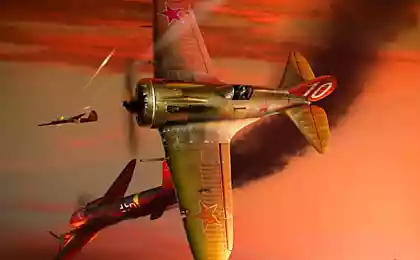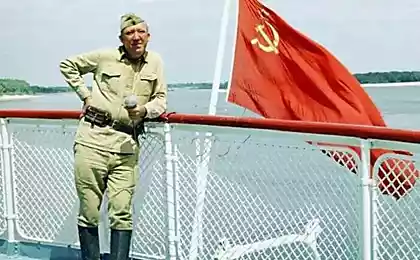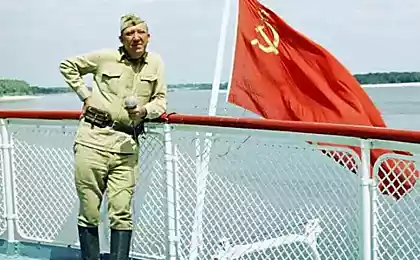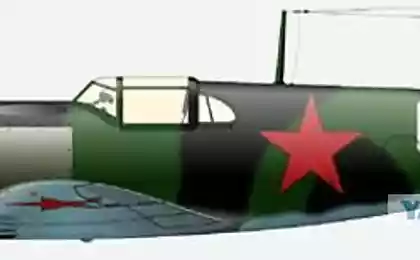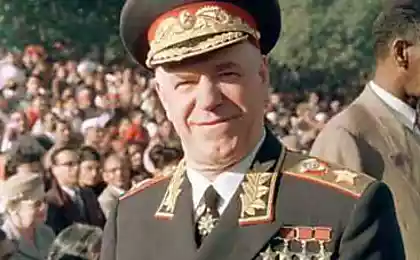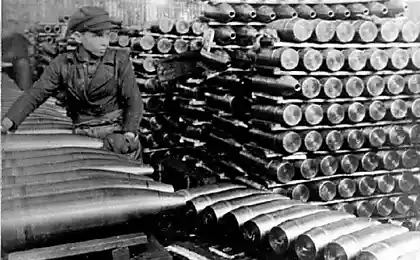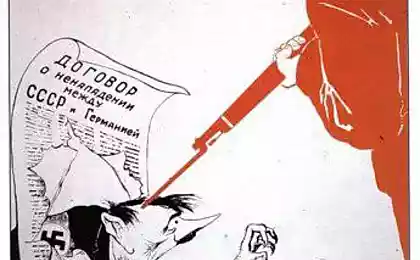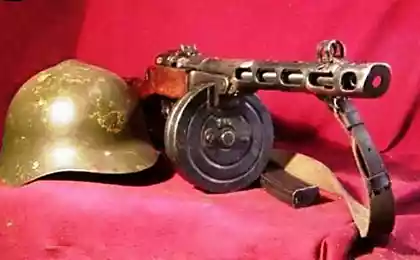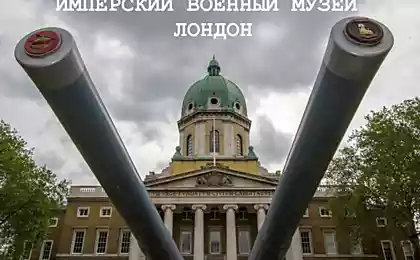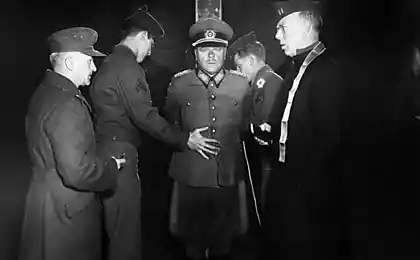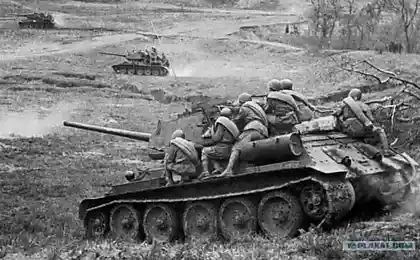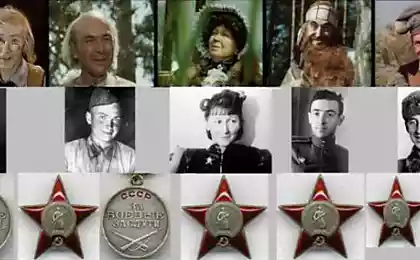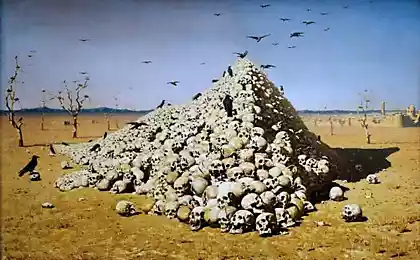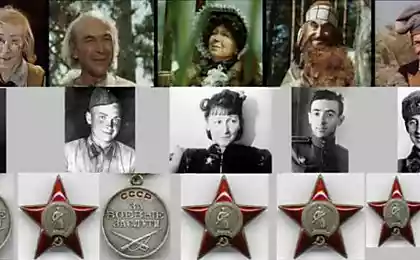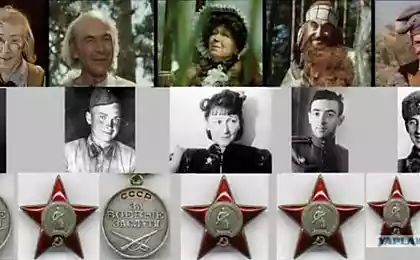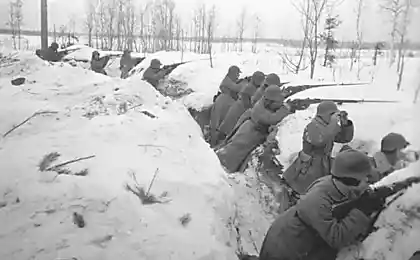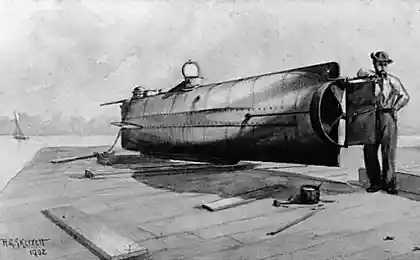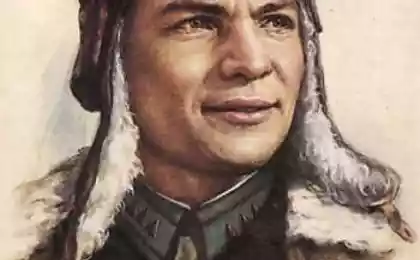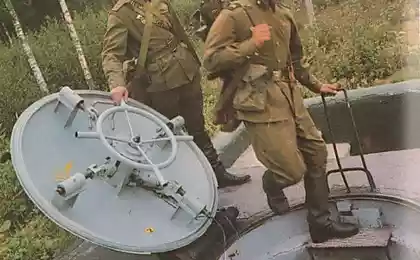1446
Children of War (12 photos)
In that distant summer day June 22, 1941 people were engaged in the usual things for themselves. Pupils preparing for the prom. The girls were building huts and played "Mothers and Daughters", restless boy to ride on wooden horses, presenting itself the Red Army. And no one suspected that pleasant chores, and perky games, and many lives would negate one terrible word - war. In a generation born from 1928 to 1945, was stolen childhood. "Children of the Great Patriotic War" - so called today's 59-76-year-olds. And it is not only the date of birth. They brought the war.
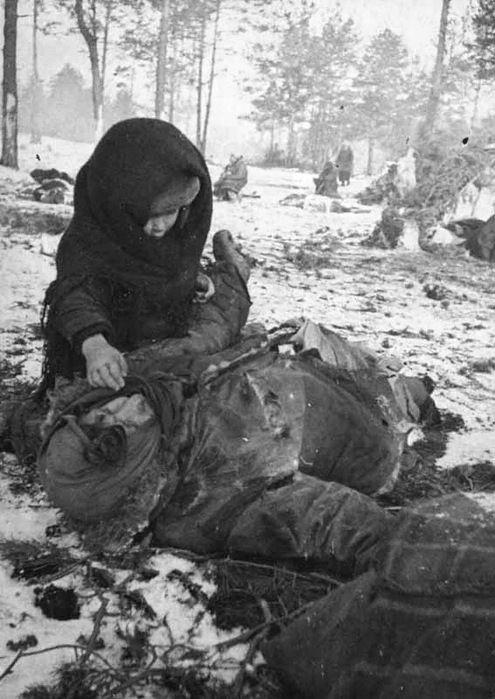
eighth day of September, Hitler's troops seized the city Shlissel'burg at the source of the Neva River and surrounded Leningrad from the land. Started 871 - day siege of the city on the Neva. The only way to the besieged city was scantily Lake Ladoga. From Leningrad on the water was evacuated 33,479 people, but navigation was deadly. Frequent raids by enemy aircraft and unpredictable autumn storms do every flight feat.
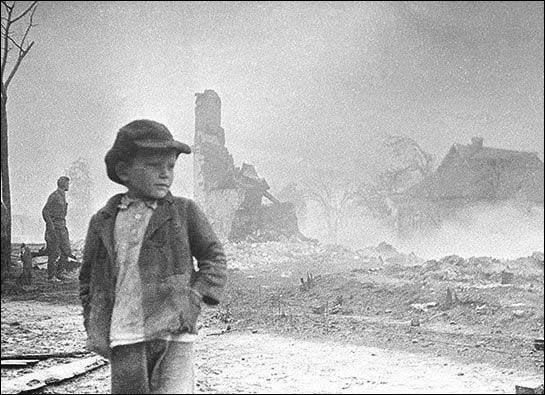
July 15, 1943 Toll Frolov on the ashes of his home. The village Ulyanovo Orel region
From the memoirs of Valentina Potarayko: "I was 5 to 6 years. From Leningrad we were evacuated to the Perm region. Transported across Lake Ladoga, where we got bombed. Many children died then and who survived, had suffered fear and terror. We drove to the Urals in the freight trains with cattle. For a small station Nazis bombed the train cars caught fire. Everything is mixed: methane from side to side, people crying babies, horses neighing, mooing cows, pigs squealed. My older sister Nina was wounded by shrapnel in the face. Ears and fractured jaws gushing blood. Middle sister Tamara bullets hit in the leg, her mother was fatally wounded. For life, I remember this picture. With killed filmed warm clothes and shoes, and then they were dumped into a mass grave. I shouted: "Uncle, do not my mother!" Sisters led away to provide them with medical care, and I sat next to his mother, who put on the sawdust. Strong winds, dust filled her wounds, mom moaned, and I scrubbed her wounds and asked: "Mom, do not die!" But she died. I was left alone ».
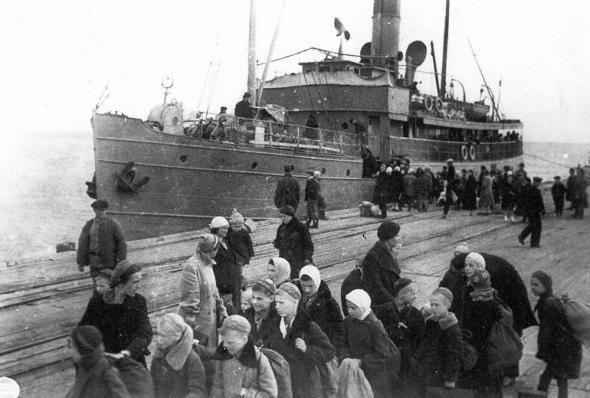
Evacuation. Of Leningrad during the landing on the ship in 1942
War weaned these children cry. Valentina recalls: "When our train was bombed for the second time, we got into the hands of the Germans. Fascists lined up children alone, adults separately. Horror nobody cried, looking at all the glass eyes. We clearly learned a lesson: cry - shot. So before our eyes killed the little girl who cried without stopping. German led her out of the ranks, for all to see, and shot. Everyone understood without a translator - can not cry. " Just like life extinguished. Fascist nonhumans shot at children for fun, to see how the kids run away in fear, or chose their living target, to practice in accuracy. The child can not work, no benefit from it, so you can kill with impunity. Although the camp is for children and work. For example, to make human ashes from the crematorium and sew it into bags, then to these ashes to fertilize the ground. Prisoners in the camp children were blood donors for German soldiers. And how cynical they "sorted" on suitable and unsuitable for use. Went growth falls short of the painted on the wall of the barracks line - will serve as a "Greater Germany" below the required mark - to send to the furnace. And desperately stretched up guys stood on tiptoes, seemed to be deceived, will remain alive, but ruthless machine Reich kids do not need, she let them into the furnace to increase and build momentum.
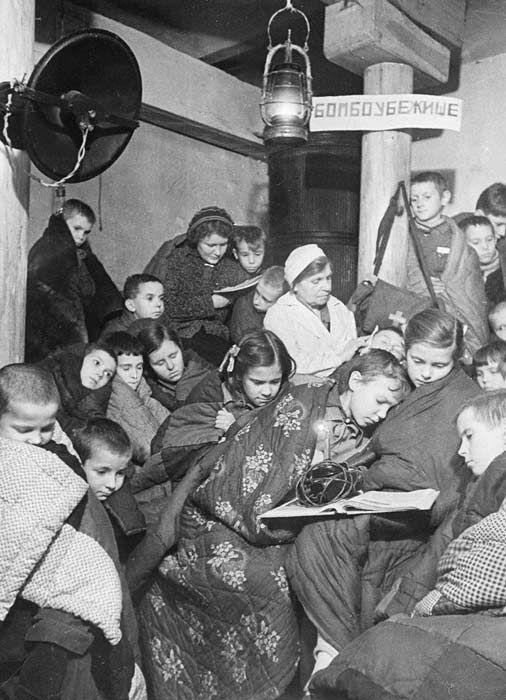
Children in a bomb shelter during a raid by enemy aircraft (unknown year)
Lost parents, brothers and sisters. Sometimes frightened children for several days sitting next to cold dead bodies of mothers waiting for their fate. At best, they waited for a Soviet orphanage, at worst - in fascist dungeons. But many fought against fascism in arms, becoming the sons and daughters of regiments.
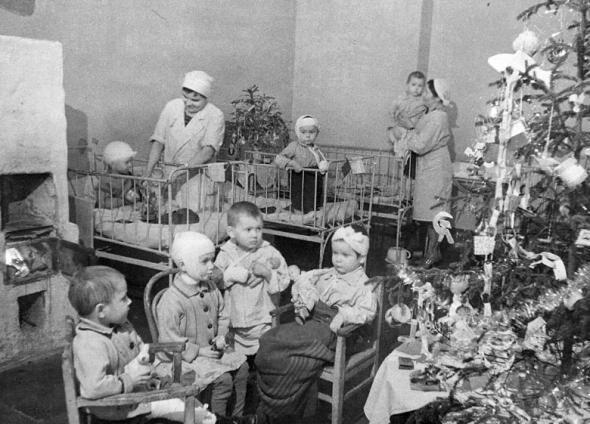
In the surgical department of the city children's hospital named after Dr. Rauhfusa, New Year 1941/42
Recalls Nicholas Panteleevich Kryzhko: "Our orphanage in Stalino evacuated when the Germans were already on the outskirts of the city. I was 11 years old. Stalino of children of the orphanage helped drive cattle. On the way we picked up horses, cows Army and gradually scattered in all directions. Winter I wandered in the wilderness, hunted on the railroad, so got to Stalingrad. In the autumn of 1942 I was sheltered by soldiers in 1095 Artillery Regiment, fed, washed, warmed. The unit commander several times sent me, but I came back again. And then the commander Victor Veprik ordered to enroll me in the States and put on rations. So I stayed till the end of the war the son of the 150th Regiment of the Sevastopol Orders of Suvorov and Kutuzov cannon artillery brigade of the 2nd Guards Army, went from Stalingrad to East Prussia, fought on the Saur-Tomb, went to explore and adjust fire in Sevastopol , Konigsberg, saw. In Belarus under Siauliai was wounded by a shell fragment and sent to the park platoon. Got there - German machine over his shoulder, two discs to his haversack lie in mittens - grenade under his shirt "Parabellum" hidden. That such was my arms ».
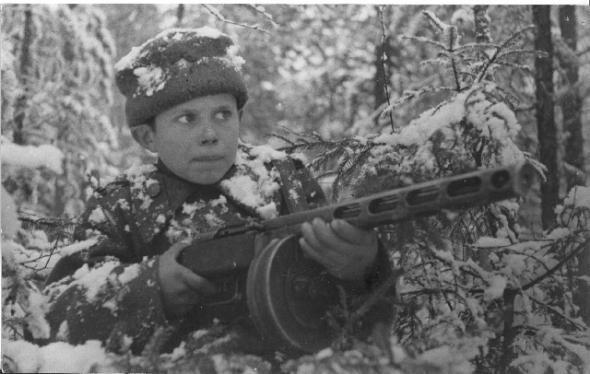
Guard soldier Ivan Frolovich Kamyshev 14 years. Ural Volunteer Tank Corps
Nicholas Panteleevich awarded the Order of the Patriotic War, 2 nd degree, medals "For Military Merit", "For the capture of Koenigsberg", thanks for taking the commander of Sevastopol. In premium sheet noted that Kohl Kryzhko served as an artillery scout, identify enemy targets come from intelligence unscathed and with valuable information to help carry out combat missions. But in 1945 he was only 14 years old. Before the war, Nicholas Panteleevich finished all 3 classes, and went back to night school as early as 25 years of age. He was deputy chief of the "Search", collecting materials for the "Book of Memory." Who would like to go to Moscow to meet with veterans of the 2nd Guards Army, but give only travel on the territory of Ukraine.
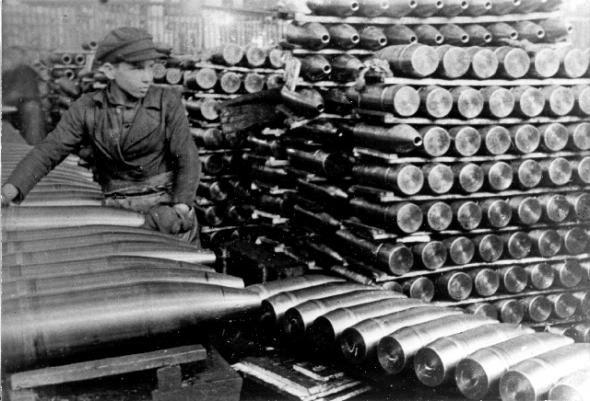
In the rear - Plant №63
Childhood swallowed war youth - the post-war devastation and famine. "We are constantly threw from one orphanage to another, - says Valentina - Volodinsky, Usolsky, Kasibsky two years - in 1946-1947. I did not know the taste of bread. During this terrible hunger rate was as follows: breakfast and dinner - 100 grams of bread, lunch - 200. But these guys were taken Hunk always stronger. I ate only porridge and soup, seasoned with a spoon of cod liver oil. Orphans stood for hours in the shops and waiting when the seller give them a handful of bread crumbs that remained after cutting ».
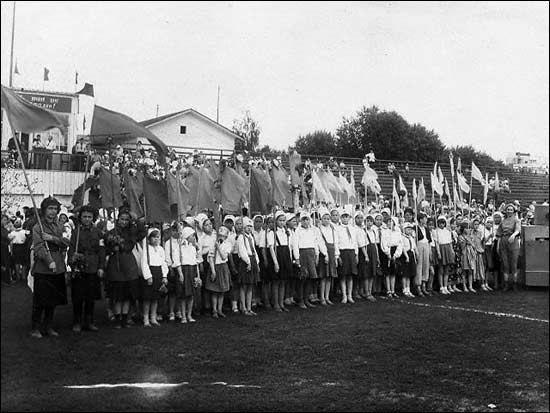
Children during the traditional holiday dedicated to the end of the school year. June 22, 1941 Place: Molotov
It is these children during the war to rebuild their shattered economy in 12 years have become machines in factories, working on construction sites. Bred labor and valor, they matured early, replacing dead parents their brothers and sisters.
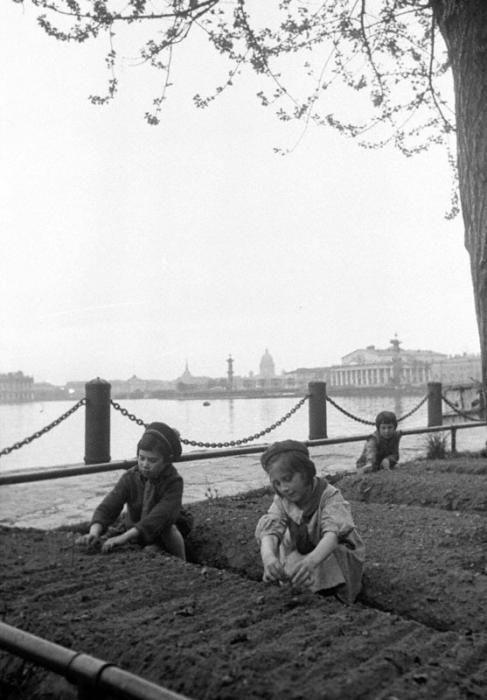
Children at the beds on the waterfront in Leningrad, 1942
Recalls the war lecturer MUK-VG 21 Komandrovsky The war began for me and my parents June 21, 1941, as his father was a border guard, on Saturday said goodbye to us and went to the border, and we lived in a border town. Mom and I (I'm 9 years old) had to sit in the train. On the road for about a month to Moscow had everything: the bombing, and the dead, and in his eyes to kill people ... were evacuated to the Urals, where were their deprivation due to insecurity and hunger. However, the school children were fed some semblance of lunch. After winning schools also fed: given a piece of black bread 5cm * 5cm, smeared with jam. As a mom to make ends meet, it is not clear. Do you know what "zatiruha"? In boiling water rushes as a zhmenek flour, mixed, the food is ready. From day to day, but not always 3 times. But I did not starve to swell. Can not be compared with children who were brought from the besieged Leningrad. From the train and took out the dead from exhaustion on the way ... And the parents I were alive in an orphanage, I was not. Although boarding October 44th to Victory was. Dad was alive, we learned until December 41st. From the newspaper, which were printed lists awarded military orders and medals. There were other deprivation during the war and in the years following. For a long time I and many of my companions wanted to just eat bread. But this is not the hardships and horrors that have suffered many children lost their parents, who were in occupation or stolen in Nazi captivity.
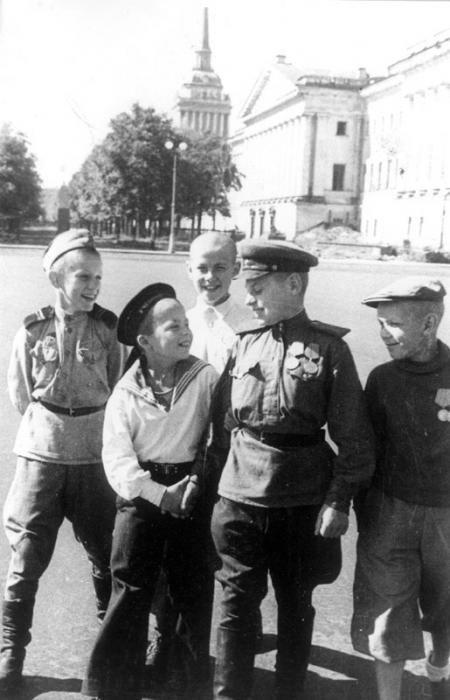
Young defenders of Leningrad in the Palace Square, 1945
My relatives from the Donbass were deported to Germany - a boy and a girl of 12 years, or more precisely a girl 16 years. Boy and disappeared in nemetchiny, nothing is known about him. A girl (Sobin) - this is the whole story. The fact that Sobin, a slave in essence, something not pleased, a German mistress and that she was sent to Majdanek camp for destruction. But as a little girl was formed in medicine, it was left at the camp hospital. Her future husband, Thaddeus was a member of the Polish underground, hunted by the Gestapo after him. Took hostage of his father and brother and mother were warned that they would be hanged if Tadeusz not give up.
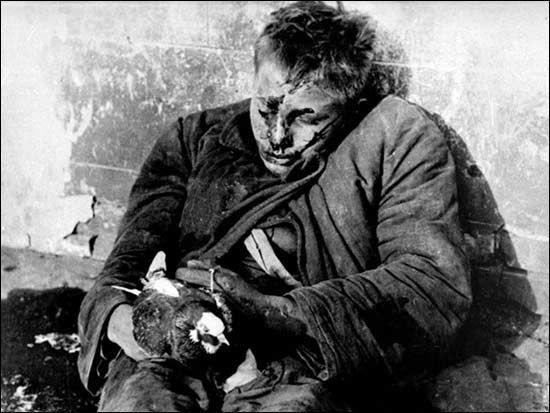
Killed boy Victor Cherevichkin with a dove in his hands (the year of shooting is not installed). Place: Rostov-on-Don
But Tadeusz with many other Poles hit the raid, and he was sent to Majdanek for destruction. A father and brother with the people, were driven to the central square of Krakow, including when the mother hanged. Then the mother went mad. The camp Tadeusz after a short time was in turn a pile to be burned. On this he was not thinking, because weighed about 48 kg with height 180 cm and normal weight under 100. The camp operated underground, Tadeusz transported to the hospital. There Sobin its release, they fell in love, got married after his release. They were visiting us and we were with them on the invitation. It should be noted here that. Children remain largely children, even in the harshest conditions.
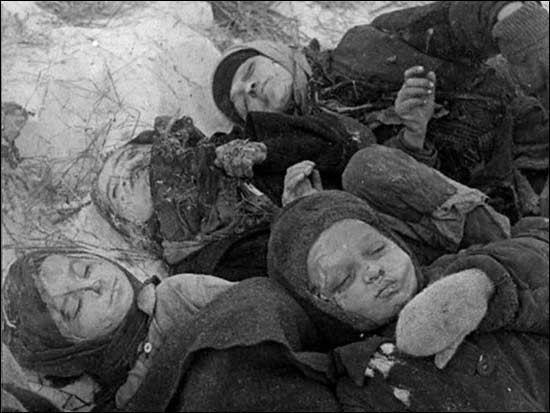
Tortured children in 1942 Place: Stalingrad
Together with his father
Went last week the defense of Sevastopol in June 1942. In those days, the besieged city penetrated only single warships. The last of them was the destroyer "Flawless" and leader of the "Tashkent". Commanded "flawless" commander P. Buryak. With him on the ship sailed as a cabin boy and his son Vladimir, has not yet reached draft age. Combat schedule was one of the rooms of calculating anti-aircraft machine gun, which is located on the navigating bridge wing.
June 25 destroyer took a cargo berth port of Novorossiysk. On the eve of Volodya had a fever, and the ship's doctor had prescribed bed rest. And as Volodya was not in the state of the ship's crew and Novorossiysk lived his mother, the doctor sent him home for treatment. Morning Volodya remembered that I forgot to tell his partner on the calculation, which put one of the spare parts, machine gun that could be needed in combat. Jumping out of bed, he ran to the ship.
Destroyer sailors knew that this campaign could be the last, as the break in Sevastopol with each passing day becomes more difficult. Some of them left on the shore of letters and memorabilia with a request to send to their families, if the destroyer of the campaign will not return. Upon hearing this, Volodya decided to stay on the ship. When the alarm sounded before going to act with mooring lines and father rose to the navigation bridge, he saw Volodya.
- Why are you here? Quickly run home, his mother is worried - he said sternly to his son.
- Father, - said Vladimir - some sailors say that the ship will not return from a hike. If I leave, all will believe in it ...
No one knows that he thought at the time his father, but he went to his son, embraced him, patted his hair, and then gently pushed, took his place at the engine telegraph and ordered to give moorings. Volodya, as always, got up from his gun ... Early in the morning of June 26 "Flawless" attacked the enemy planes. One attack followed another. Anti-aircraft gunners shot down two aircraft destroyer, but one of the bombs hit the ship. Destroyer slowed. New attack ... Volodya does not depart from the gun. Fire highway stretch to one and then to another enemy vultures. Does not remove the hand from the engine telegraph father. The ship then rushes forward, slicing through the breast azure sea surface, then, shaking roar feed screw stops. Another bomb hit the ship, several other exploded near the board. "Flawless" lost speed.
His food slowly began to go under water. By order of the commander of the ship leaving the Marines first, then crew members. People jumped into the water and tried to sail faster from drowning ship. Above them with a roar rushed the enemy planes. And with the ship heeling the aircraft hit the cannon and machine guns, trying to cover up the people against attacks from the air. Until the last second beat with a machine gun and wing flying bridge, while the Telegraph already silenced machine stood motionless commander. Commander P. Buryak and his son Volodya died without leaving their battle stations ...
Two years have passed. Sailors Dnieper flotilla together with the troops of the front fought on the banks of the Dnieper, the Desna, a small river Pina, near the mouth of which is the town of Pinsk. The structure of armored fleet entered and BCA-92, on which a cabin boy sailed fourteen Oleg Olkhovskiy. His father, a senior lieutenant P. Olkhovskiy, served as a mechanic squad boats.
On the night of July 12, 1944 a group of armored secretly climbed up the river, crossed the front line and, suddenly appeared near Pinsk port, a landing sailors. Paratroopers with the battle began to move to the city, and boats kept their artillery and machine-gun fire. Enemy pulled to shore artillery. Increasingly, the shells began to burst near the armored. From getting one of them on the BCA-92 fire broke out. Heavily armored commander was wounded Lieutenant I. Chernozubov. Command boat took senior lieutenant P. Olkhovskiy. A few minutes later another splinter exploded near the boat steering projectile was killed. P. Olkhovskiy he stood at the helm of the boat and began to withdraw from the zone of fire of enemy guns. Again there was a roar of the explosion. At this time, an artillery shell hit the tower. After a few seconds, was mortally wounded in the chest P. Olkhovskiy.
His son, who was previously in the engine room, on strange behavior of the boat felt something was wrong and made his way into the room. Here he saw lying on the deck of his father. He was already dead ... From the ruined tower artillery shell was light smoke. Silent anti-aircraft machine gun - dead gunner was lying nearby. No one was visible in the turret. Probably, the Nazis decided that the boat was left alive, and cease fire on him.
And suddenly revived coaxial machine gun turret. This Oleg Olkhovskiy long queues shot pops up on the shore of the Nazis. The enemy again began to fire boat artillery and machine guns, began singing again on his deck pieces. One after another, pierced shells and bullets in a boat. In several places, the flames broke out. Simmer it was no one. Rocking on the waves raised by the explosions, BCA-92 slowly approached the coast, occupied by the Nazis. A machine gun shoot and shoot ... Fired up until one of the shells did not hit the turret ...... As a monument to the young hero, as a remembrance of this fight, on the Dnieper Pleso floating ship "Oleg Olkhovskiy." Hopefully, someday we will meet in the sea a ship on board which will read "Volodya beet ..."

eighth day of September, Hitler's troops seized the city Shlissel'burg at the source of the Neva River and surrounded Leningrad from the land. Started 871 - day siege of the city on the Neva. The only way to the besieged city was scantily Lake Ladoga. From Leningrad on the water was evacuated 33,479 people, but navigation was deadly. Frequent raids by enemy aircraft and unpredictable autumn storms do every flight feat.

July 15, 1943 Toll Frolov on the ashes of his home. The village Ulyanovo Orel region
From the memoirs of Valentina Potarayko: "I was 5 to 6 years. From Leningrad we were evacuated to the Perm region. Transported across Lake Ladoga, where we got bombed. Many children died then and who survived, had suffered fear and terror. We drove to the Urals in the freight trains with cattle. For a small station Nazis bombed the train cars caught fire. Everything is mixed: methane from side to side, people crying babies, horses neighing, mooing cows, pigs squealed. My older sister Nina was wounded by shrapnel in the face. Ears and fractured jaws gushing blood. Middle sister Tamara bullets hit in the leg, her mother was fatally wounded. For life, I remember this picture. With killed filmed warm clothes and shoes, and then they were dumped into a mass grave. I shouted: "Uncle, do not my mother!" Sisters led away to provide them with medical care, and I sat next to his mother, who put on the sawdust. Strong winds, dust filled her wounds, mom moaned, and I scrubbed her wounds and asked: "Mom, do not die!" But she died. I was left alone ».

Evacuation. Of Leningrad during the landing on the ship in 1942
War weaned these children cry. Valentina recalls: "When our train was bombed for the second time, we got into the hands of the Germans. Fascists lined up children alone, adults separately. Horror nobody cried, looking at all the glass eyes. We clearly learned a lesson: cry - shot. So before our eyes killed the little girl who cried without stopping. German led her out of the ranks, for all to see, and shot. Everyone understood without a translator - can not cry. " Just like life extinguished. Fascist nonhumans shot at children for fun, to see how the kids run away in fear, or chose their living target, to practice in accuracy. The child can not work, no benefit from it, so you can kill with impunity. Although the camp is for children and work. For example, to make human ashes from the crematorium and sew it into bags, then to these ashes to fertilize the ground. Prisoners in the camp children were blood donors for German soldiers. And how cynical they "sorted" on suitable and unsuitable for use. Went growth falls short of the painted on the wall of the barracks line - will serve as a "Greater Germany" below the required mark - to send to the furnace. And desperately stretched up guys stood on tiptoes, seemed to be deceived, will remain alive, but ruthless machine Reich kids do not need, she let them into the furnace to increase and build momentum.

Children in a bomb shelter during a raid by enemy aircraft (unknown year)
Lost parents, brothers and sisters. Sometimes frightened children for several days sitting next to cold dead bodies of mothers waiting for their fate. At best, they waited for a Soviet orphanage, at worst - in fascist dungeons. But many fought against fascism in arms, becoming the sons and daughters of regiments.

In the surgical department of the city children's hospital named after Dr. Rauhfusa, New Year 1941/42
Recalls Nicholas Panteleevich Kryzhko: "Our orphanage in Stalino evacuated when the Germans were already on the outskirts of the city. I was 11 years old. Stalino of children of the orphanage helped drive cattle. On the way we picked up horses, cows Army and gradually scattered in all directions. Winter I wandered in the wilderness, hunted on the railroad, so got to Stalingrad. In the autumn of 1942 I was sheltered by soldiers in 1095 Artillery Regiment, fed, washed, warmed. The unit commander several times sent me, but I came back again. And then the commander Victor Veprik ordered to enroll me in the States and put on rations. So I stayed till the end of the war the son of the 150th Regiment of the Sevastopol Orders of Suvorov and Kutuzov cannon artillery brigade of the 2nd Guards Army, went from Stalingrad to East Prussia, fought on the Saur-Tomb, went to explore and adjust fire in Sevastopol , Konigsberg, saw. In Belarus under Siauliai was wounded by a shell fragment and sent to the park platoon. Got there - German machine over his shoulder, two discs to his haversack lie in mittens - grenade under his shirt "Parabellum" hidden. That such was my arms ».

Guard soldier Ivan Frolovich Kamyshev 14 years. Ural Volunteer Tank Corps
Nicholas Panteleevich awarded the Order of the Patriotic War, 2 nd degree, medals "For Military Merit", "For the capture of Koenigsberg", thanks for taking the commander of Sevastopol. In premium sheet noted that Kohl Kryzhko served as an artillery scout, identify enemy targets come from intelligence unscathed and with valuable information to help carry out combat missions. But in 1945 he was only 14 years old. Before the war, Nicholas Panteleevich finished all 3 classes, and went back to night school as early as 25 years of age. He was deputy chief of the "Search", collecting materials for the "Book of Memory." Who would like to go to Moscow to meet with veterans of the 2nd Guards Army, but give only travel on the territory of Ukraine.

In the rear - Plant №63
Childhood swallowed war youth - the post-war devastation and famine. "We are constantly threw from one orphanage to another, - says Valentina - Volodinsky, Usolsky, Kasibsky two years - in 1946-1947. I did not know the taste of bread. During this terrible hunger rate was as follows: breakfast and dinner - 100 grams of bread, lunch - 200. But these guys were taken Hunk always stronger. I ate only porridge and soup, seasoned with a spoon of cod liver oil. Orphans stood for hours in the shops and waiting when the seller give them a handful of bread crumbs that remained after cutting ».

Children during the traditional holiday dedicated to the end of the school year. June 22, 1941 Place: Molotov
It is these children during the war to rebuild their shattered economy in 12 years have become machines in factories, working on construction sites. Bred labor and valor, they matured early, replacing dead parents their brothers and sisters.

Children at the beds on the waterfront in Leningrad, 1942
Recalls the war lecturer MUK-VG 21 Komandrovsky The war began for me and my parents June 21, 1941, as his father was a border guard, on Saturday said goodbye to us and went to the border, and we lived in a border town. Mom and I (I'm 9 years old) had to sit in the train. On the road for about a month to Moscow had everything: the bombing, and the dead, and in his eyes to kill people ... were evacuated to the Urals, where were their deprivation due to insecurity and hunger. However, the school children were fed some semblance of lunch. After winning schools also fed: given a piece of black bread 5cm * 5cm, smeared with jam. As a mom to make ends meet, it is not clear. Do you know what "zatiruha"? In boiling water rushes as a zhmenek flour, mixed, the food is ready. From day to day, but not always 3 times. But I did not starve to swell. Can not be compared with children who were brought from the besieged Leningrad. From the train and took out the dead from exhaustion on the way ... And the parents I were alive in an orphanage, I was not. Although boarding October 44th to Victory was. Dad was alive, we learned until December 41st. From the newspaper, which were printed lists awarded military orders and medals. There were other deprivation during the war and in the years following. For a long time I and many of my companions wanted to just eat bread. But this is not the hardships and horrors that have suffered many children lost their parents, who were in occupation or stolen in Nazi captivity.

Young defenders of Leningrad in the Palace Square, 1945
My relatives from the Donbass were deported to Germany - a boy and a girl of 12 years, or more precisely a girl 16 years. Boy and disappeared in nemetchiny, nothing is known about him. A girl (Sobin) - this is the whole story. The fact that Sobin, a slave in essence, something not pleased, a German mistress and that she was sent to Majdanek camp for destruction. But as a little girl was formed in medicine, it was left at the camp hospital. Her future husband, Thaddeus was a member of the Polish underground, hunted by the Gestapo after him. Took hostage of his father and brother and mother were warned that they would be hanged if Tadeusz not give up.

Killed boy Victor Cherevichkin with a dove in his hands (the year of shooting is not installed). Place: Rostov-on-Don
But Tadeusz with many other Poles hit the raid, and he was sent to Majdanek for destruction. A father and brother with the people, were driven to the central square of Krakow, including when the mother hanged. Then the mother went mad. The camp Tadeusz after a short time was in turn a pile to be burned. On this he was not thinking, because weighed about 48 kg with height 180 cm and normal weight under 100. The camp operated underground, Tadeusz transported to the hospital. There Sobin its release, they fell in love, got married after his release. They were visiting us and we were with them on the invitation. It should be noted here that. Children remain largely children, even in the harshest conditions.

Tortured children in 1942 Place: Stalingrad
Together with his father
Went last week the defense of Sevastopol in June 1942. In those days, the besieged city penetrated only single warships. The last of them was the destroyer "Flawless" and leader of the "Tashkent". Commanded "flawless" commander P. Buryak. With him on the ship sailed as a cabin boy and his son Vladimir, has not yet reached draft age. Combat schedule was one of the rooms of calculating anti-aircraft machine gun, which is located on the navigating bridge wing.
June 25 destroyer took a cargo berth port of Novorossiysk. On the eve of Volodya had a fever, and the ship's doctor had prescribed bed rest. And as Volodya was not in the state of the ship's crew and Novorossiysk lived his mother, the doctor sent him home for treatment. Morning Volodya remembered that I forgot to tell his partner on the calculation, which put one of the spare parts, machine gun that could be needed in combat. Jumping out of bed, he ran to the ship.
Destroyer sailors knew that this campaign could be the last, as the break in Sevastopol with each passing day becomes more difficult. Some of them left on the shore of letters and memorabilia with a request to send to their families, if the destroyer of the campaign will not return. Upon hearing this, Volodya decided to stay on the ship. When the alarm sounded before going to act with mooring lines and father rose to the navigation bridge, he saw Volodya.
- Why are you here? Quickly run home, his mother is worried - he said sternly to his son.
- Father, - said Vladimir - some sailors say that the ship will not return from a hike. If I leave, all will believe in it ...
No one knows that he thought at the time his father, but he went to his son, embraced him, patted his hair, and then gently pushed, took his place at the engine telegraph and ordered to give moorings. Volodya, as always, got up from his gun ... Early in the morning of June 26 "Flawless" attacked the enemy planes. One attack followed another. Anti-aircraft gunners shot down two aircraft destroyer, but one of the bombs hit the ship. Destroyer slowed. New attack ... Volodya does not depart from the gun. Fire highway stretch to one and then to another enemy vultures. Does not remove the hand from the engine telegraph father. The ship then rushes forward, slicing through the breast azure sea surface, then, shaking roar feed screw stops. Another bomb hit the ship, several other exploded near the board. "Flawless" lost speed.
His food slowly began to go under water. By order of the commander of the ship leaving the Marines first, then crew members. People jumped into the water and tried to sail faster from drowning ship. Above them with a roar rushed the enemy planes. And with the ship heeling the aircraft hit the cannon and machine guns, trying to cover up the people against attacks from the air. Until the last second beat with a machine gun and wing flying bridge, while the Telegraph already silenced machine stood motionless commander. Commander P. Buryak and his son Volodya died without leaving their battle stations ...
Two years have passed. Sailors Dnieper flotilla together with the troops of the front fought on the banks of the Dnieper, the Desna, a small river Pina, near the mouth of which is the town of Pinsk. The structure of armored fleet entered and BCA-92, on which a cabin boy sailed fourteen Oleg Olkhovskiy. His father, a senior lieutenant P. Olkhovskiy, served as a mechanic squad boats.
On the night of July 12, 1944 a group of armored secretly climbed up the river, crossed the front line and, suddenly appeared near Pinsk port, a landing sailors. Paratroopers with the battle began to move to the city, and boats kept their artillery and machine-gun fire. Enemy pulled to shore artillery. Increasingly, the shells began to burst near the armored. From getting one of them on the BCA-92 fire broke out. Heavily armored commander was wounded Lieutenant I. Chernozubov. Command boat took senior lieutenant P. Olkhovskiy. A few minutes later another splinter exploded near the boat steering projectile was killed. P. Olkhovskiy he stood at the helm of the boat and began to withdraw from the zone of fire of enemy guns. Again there was a roar of the explosion. At this time, an artillery shell hit the tower. After a few seconds, was mortally wounded in the chest P. Olkhovskiy.
His son, who was previously in the engine room, on strange behavior of the boat felt something was wrong and made his way into the room. Here he saw lying on the deck of his father. He was already dead ... From the ruined tower artillery shell was light smoke. Silent anti-aircraft machine gun - dead gunner was lying nearby. No one was visible in the turret. Probably, the Nazis decided that the boat was left alive, and cease fire on him.
And suddenly revived coaxial machine gun turret. This Oleg Olkhovskiy long queues shot pops up on the shore of the Nazis. The enemy again began to fire boat artillery and machine guns, began singing again on his deck pieces. One after another, pierced shells and bullets in a boat. In several places, the flames broke out. Simmer it was no one. Rocking on the waves raised by the explosions, BCA-92 slowly approached the coast, occupied by the Nazis. A machine gun shoot and shoot ... Fired up until one of the shells did not hit the turret ...... As a monument to the young hero, as a remembrance of this fight, on the Dnieper Pleso floating ship "Oleg Olkhovskiy." Hopefully, someday we will meet in the sea a ship on board which will read "Volodya beet ..."
